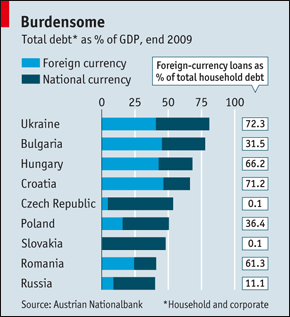Austrian finance minister Josef Pröll had said earlier that Austria will not move on a loosening of bank secrecy as long as UK based trusts are able to invest anonymously and wants to shift this discussion onto the OECD level.
Conservative Pröll, currently breaching Austria's constitution with the nod of social democrat chancellor Werner Faymann, because both ruling parties want to delay the 2011 budget until after two provincial elections in October, may have other worries about the Austrian banking sector on his mind.
Recent data from Austria's central bank confirms that Austria's banks, mainly Raiffeisen group and Erste Group, are still heavily dependent on favorable forex crosses, i.e. Central Eastern European (CEE) currencies and the Swiss Franc.
The Economist today had this graph based on data from Oesterreichische Nationalbank (OeNB) that shows that CEE inhabitants are highly leveraged with foreign currency loans that become more expensive day by day as long as the Swiss Franc and the Euro rise against their domestic currencies.
From the Economist:
In early August a number of banks operating in the region reported sometimes startling rises in loan losses. Among them were UniCredit, Erste Group and OTP. It had been hoped that loan losses would start falling. Instead they have continued to climb—alarmingly in some cases. In Kazakhstan more than a third of outstanding debt is non-performing. In Latvia, almost a fifth of debt is going bad.
In Hungary and Poland the proportion of debt that is souring is below 8%, though in both countries it is still rising and, because their economies are bigger, their bad debts can cause more havoc. Non-performing loans in Ukraine are officially below 10% of the total, but quirks in the tax law punish banks for writing off loans. The IMF reckons the true figure is closer to 30%.
The main reason for the sharp rise in bad debts is that borrowers had became unhealthily addicted to loans in foreign currencies, such as the Swiss franc, which offered lower interest rates than local-currency debt. In Hungary almost two-thirds of household debt is in foreign currencies (see chart). In Latvia about 90% of all private borrowing is. A steep rise in the value of the Swiss franc against local currencies has increased the burden of debt and interest payments on the region’s borrowers. The strains have been made worse by collapsing housing markets and the general economic slowdown.While observers of Austria's role in CEE may not exactly be surprised - find an overview of CEE bank players here - I am a bit worried that recent OeNB data shows that Austrian banks have reduced their Eurozone share of forex loans by less than a fifth since January 2007.
GRAPH: Austrian banks have reduced their share of private forex loans in the Eurozone from 48% to 41.6% since January 2007. The small to midsize banks of this tiny country of 8 million still hold by far more forex loans than any other Eurozone bank sector on the national level. I am not sure whether the Austrian arm of Italy's Unicredit Group is included in this data set or nt. Data: OeNB, ECB.
Austrian banks have drastically curbed domestic lending to both consumers and businesses in the last 2 years and it is an open secret in the chatty Cafes of Vienna that they survive primarily by a reluctance to write down loans to their real market value.
It was the bankruptcy of then Rothschild-owned Creditanstalt in 1931 that led to the European depression. If one of Austria's top 3 banks falters, and this is more a when-question, we may see a rerun of history. It won't be nice, to say it courtly. DISCLOSURE: No related position but a vital historical interest.
Reprinted from theprudentinvestor "Updateo On The [Bad] Situation Of Austrian Banks"




Comments